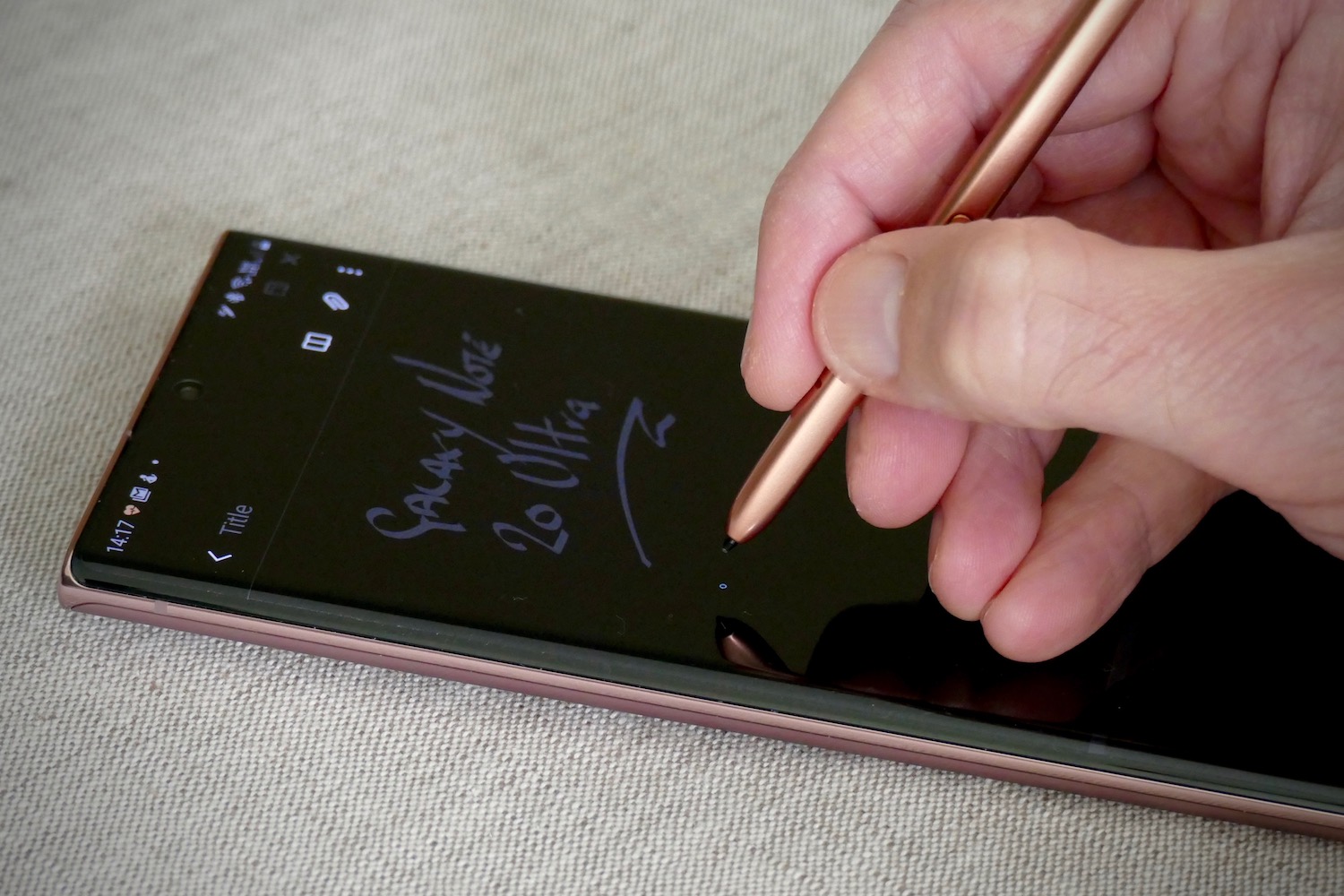The Samsung Galaxy Note 20 Ultra is even better than it was in August, thanks to software updates, so much so that we’ve upped its review score. When I reviewed the phone in August, I listed three main downsides: It’s big and heavy, the fingerprint sensor is finicky, and there were palm rejection and edge recognition problems. Now, after returning to the Note 20 Ultra weeks after its release, there has been a significant and very positive change.
Software updates following release have almost completely cured the Note 20 Ultra of its annoying palm rejection problems, which in turn seem to have eliminated the edge recognition issues, too. Not sure what these are? Let me explain, and I’ll start with the palm recognition. When you use the S Pen stylus to write notes on the Note 20 Ultra’s screen, your hand naturally rests on the lower part, which unfortunately resulting in messy writing and poor accuracy because the phone didn’t understand what was touching the screen and where.
Big improvements
This made it difficult to really appreciate the new S Pen’s 9-millisecond response time, as the Note 20 Ultra couldn’t work out where the S Pen was touching the screen. Today, it is a very different experience. My hand rests on the screen and doesn’t interfere with the S Pen’s performance at all. I can shift, fidget, and even raise and lower my hand again without issue. Writing feels more natural and responsive, and my text is much neater and more readable than before. I now write on it like an adult using my dominant hand, rather than a toddler using their toes.
The same software magic has been applied to improve edge recognition as well. The Note 20 Ultra’s curved screen means when you hold the phone normally part of your hand touches the screen itself, something that doesn’t happen with a flat-screened phone like the Asus Zenfone 7 Pro (or the base Galaxy Note 20 model).
On the Note 20 Ultra the screen didn’t dismiss these incidental touches, and would think you were trying to make a selection. This was particularly noticeable when swipe typing or reaching across the phone with my thumb. For example, in WhatsApp it would activate the voice recording button near the edge of the screen when I was trying to type a message.
More frustratingly, it would then fail to recognize when you were tapping buttons set at corner edges, such as back or exit buttons, meaning multiple taps were needed before the phone would react. This is now considerably better than it was before, with no phantom feature activations during my recent time with the phone. It does still sometimes miss button taps at the extreme edges of the screen, but with nowhere near such regularity.
A higher Galaxy Note 20 Ultra review score
All good news? Mostly, yes. Although I still find the fingerprint sensor slow and unreliable compared to most other phones, and the face unlock isn’t much better either (and nowhere near as secure as Apple’s Face ID). Whether further software updates can improve this remains to be seen, but since this is effectively the same sensor as the Galaxy S10, there’s little hope.
Samsung can’t do much about the other downside of the Note 20 Ultra though, as it’s always going to be a large, weighty phone. You either want a big phone (or will put up with it), or you don’t.

Is it unusual for a manufacturer to quickly update a new phone soon after release? It shouldn’t be, and for the most part newly released phones do get software revisions that can change the way features work for the better. It’s great to see Samsung delivering here, both quickly and effectively. One point to note is that not every Note 20 Ultra suffered from the problems I experienced, based on conversations with other reviewers, which surely made it harder for Samsung to address them.
By sending out updates to fix the screen problems, Samsung has made the Galaxy Note 20 Ultra easier to live with and less frustrating, and also let the improved S Pen really shine, too. It’s significant enough to prompt a revision of the review, and the removal of one of the downsides. In turn, this adjustment has changed the score from an eight to a nine, and it has gained our coveted Editor’s Choice award as well, where before it had a Recommended Product award. The Note 20 Ultra was a great phone before, now it’s one of the best you can buy.




